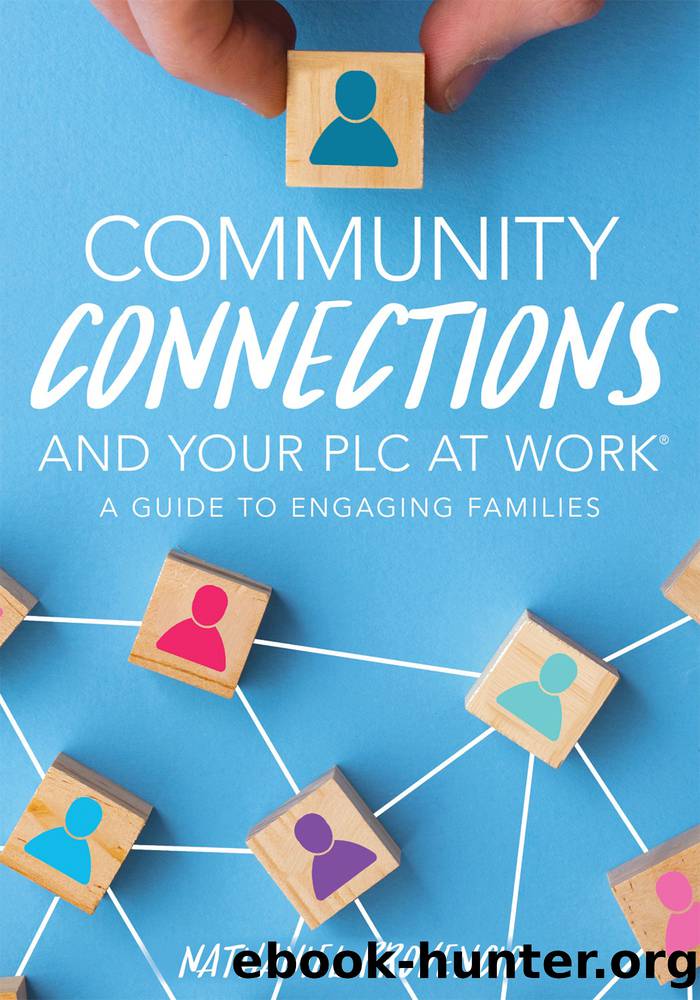Community Connections and Your PLC at Work® by Provencio Nathaniel;

Author:Provencio, Nathaniel;
Language: eng
Format: epub
Publisher: Solution Tree
Published: 2020-08-15T00:00:00+00:00
Question One: What Is My Child Learning?
Parents and families are often uninformed about what their children are currently learning or will be learning in upcoming units. In Minnieville Elementaryâs efforts to ensure all students learn at high levels, all staff must be strategic about informing parents and families about what their children will be learning before the teaching happens; that way, they can prepare and play a role in ensuring their childrenâs success.
In a PLC, collaborative teams carefully align their state standards with their yearly instructional pacing guides, creating instructional calendars and syllabi that lay out exactly what educators will teach, when they will teach it, and when they will assess it.
In a PLC focusing on building parent and family involvement and engagement, however, it makes sense for each teacher to provide parents and families with these documents at the start of the school year. Provide paper copies, online documents, or both! Parents and families who have access to instructional pacing guides and calendars can strategically work to assist their children with the units of study; they have access to information that answers the often-unanswered question, âWhat did you learn in school today?â When a child replies, âI donât knowâ or âNothing,â the parent can pull out the instructional pacing guide, go to the date, and ask specific questions about their childâs learning. If a parent didnât have access to the instructional pacing guide, the conversation might go like this, âWhat did you learn in school today?â The child replies, âI donât know.â The parent then says, âWell, that makes two of us.â
Pacing guides can be very overwhelming documents for parents and families and even for educators. One strategy teachers can implement to help parents and families work to understand the pacing guides, curriculum strategies, and objectives is to hold monthly or quarterly information nights to inform parents and families about what their children will be learning. At Minnieville Elementary, the third-, fourth-, and fifth-grade teacher teams, in collaboration with the schoolâs mathematics specialist, host quarterly mathematics family information nights. These events allow family members the opportunity to meet with their childâs teacher and learn about specific mathematics strategies and curriculum their child will be learning. These events have been extremely successful because they assist families in understanding the mathematics learning expectations. The way a parent might have learned a specific mathematics concept or strategy is often quite different than the way students are currently learning it.
Mathematics family information nights involve the mathematics specialist and grade-level teachers. The school provides food, childcare, and translation services during the event to assist families. At mathematics family information night, parents learn about the mathematics standards and objectives and practice the types of mathematics strategies their child will learn. They also learn how they can help their child at home with these math standards. After a brief overview on the mathematics standards and objectives students will be exposed to (separated by grade level), parents are then placed into smaller groups with their child to work on mathematics activities that focus on what students will learn.
Download
This site does not store any files on its server. We only index and link to content provided by other sites. Please contact the content providers to delete copyright contents if any and email us, we'll remove relevant links or contents immediately.
The Art of Coaching Workbook by Elena Aguilar(48572)
Trainspotting by Irvine Welsh(20140)
Twilight of the Idols With the Antichrist and Ecce Homo by Friedrich Nietzsche(17754)
Fangirl by Rainbow Rowell(7893)
Periodization Training for Sports by Tudor Bompa(7376)
Change Your Questions, Change Your Life by Marilee Adams(6702)
This Is How You Lose Her by Junot Diaz(5845)
Grit by Angela Duckworth(4778)
Red Sparrow by Jason Matthews(4734)
Asking the Right Questions: A Guide to Critical Thinking by M. Neil Browne & Stuart M. Keeley(4642)
Paper Towns by Green John(4209)
Room 212 by Kate Stewart(4152)
Ken Follett - World without end by Ken Follett(4003)
The Sports Rules Book by Human Kinetics(3630)
Housekeeping by Marilynne Robinson(3456)
The Motorcycle Diaries by Ernesto Che Guevara(3380)
Introduction to Kinesiology by Shirl J. Hoffman(3329)
Exercise Technique Manual for Resistance Training by National Strength & Conditioning Association(3329)
Papillon (English) by Henri Charrière(3324)
